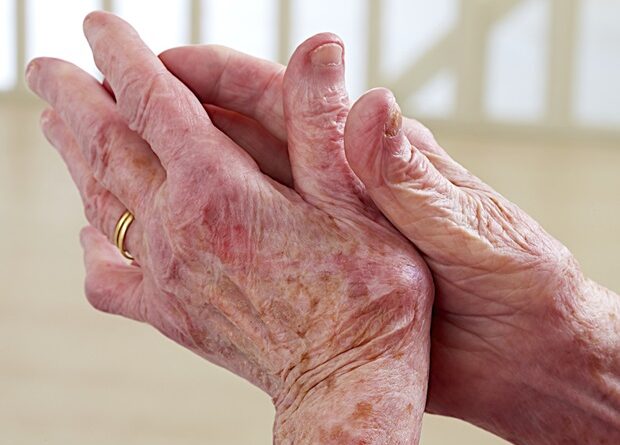Arthritis medication can reverse the lung damage of COVID
Arthritis drugs now available for prescription have the potential to halt lung complications that can last months or years after a COVID-19 infection, new research from the University of Virginia School of Medicine suggests. and Cedars-Sinai suggest.
By examining damaged human lungs and creating a new laboratory model, scientists have identified faulty immune systems responsible for the increasingly worrisome lung problems an increasing number of people after they have recovered from COVID-19. These lasting effects of COVID infection, known as “post-infection lung fibrosis,” have no effective treatments. However, new research suggests that existing drugs such as baricitinib and anakinra can disrupt the body’s ineffective immune response and ultimately allow damaged lungs to heal. get well.
Our collaboration with physicians and computational biologists at UVA and Cedars-Sinai, including Dr. Chen and Zang, led us to uncover the cause of chronic lung inflammation and scarring after severe COVID-19 and other respiratory illnesses such as the flu. “
Jie Sun, Professor, School of Medicine, University of Virginia
“Using advanced technologies such as spatial transcriptomics and complex microscopy, we compared lung cells from patients and animal models that we produced in the laboratory. We found that the inactive cells the immune system disrupts proper lung healing after viral damage. Importantly, we have also identified the molecules responsible for this and potential therapies for patients with progressive lung damage.”
“‘Spatial-omics’ is a modern technology capable of measuring molecular components with spatial information within a sample,” explained researcher Chongzhi Zang, PhD, of the UVA Department of Genome Sciences. “This work demonstrates the power of spatial transcriptomics combined with data science methods to reveal the molecular etiology of long-term COVID.”
The researchers noted that the findings could be useful not only for lung injury from COVID but also for lung fibrosis from other sources.
“This study shows that treatments used for acute disease of COVID-19 can also reduce the development of chronic sequelae, including lung injury,” said Peter Chen, MD, Molula -Medallion chair in Molecular Medicine and interim chair of the Department of Medicine at Cedars. – Sinai. “Our work will be the basis for developing treatments for lung fibrosis caused by viruses or other conditions.”
Understanding the lung damage of COVID-19
The researchers – led by Sun, Chen and Zang – wanted to better understand the cellular and molecular causes of lung problems that can follow COVID infection. These problems can include progressive lung damage and dangerous inflammation that continue well after the COVID-19 virus has been cleared from the body.
The researchers first examined severely damaged lungs from transplant patients at UVA and Cedars-Sinai. None of the patients had lung disease that would have required a transplant before contracting COVID-19, so scientists hoped the lungs would provide clues to the importance of why the patients were so badly damaged and the fibrosis persisted. Using their findings, the scientists created a new type of mouse to understand how the immune response went awry.
The researchers found that immune cells known as CD8 + T cells had negative interactions with another type of immune cells, macrophages. These interactions enabled the macrophages to drive dangerous inflammation even after the initial infection with COVID-19 had resolved, when the immune system would have stopped.
Scientists are still not sure what the cause of the immune system’s activation is – the immune system may be reacting to remnants of the COVID-19 virus, for example, or there may be another cause.
A new study suggests that this dangerous cycle of inflammation, injury and fibrosis can be broken using drugs such as baricitinib and anakinra, both of which have been approved by the federal Food and Drug Administration to treat inflammation in risk is seen in rheumatoid arthritis and alopecia. , a type of hair loss.
Although more studies are needed to confirm the drug’s effectiveness in this new setting, the researchers hope that their findings will eventually provide patients with post-COVID-19 lung problems with much-needed treatment options. .
“Tens of millions of people around the world are facing long-term complications from COVID or other post-infection syndromes,” Sun said. “We are just beginning to understand the long-term health consequences of acute infections. There is a strong need for basic, translational and clinical research, as well as multi-disciplinary collaborations, to address and these unmet needs of patients.
Source:
University of Virginia Health System
Journal reference:
Narasimhan, H., and al. (2024). Aberrant immune-epithelial progenitor niche drives viral lung sequelae. Nature. doi.org/10.1038/s41586-024-07926-8
#Arthritis #medication #reverse #lung #damage #COVID
